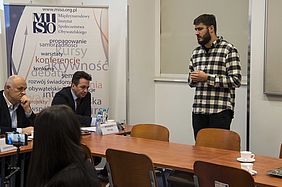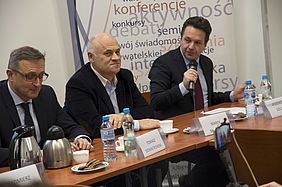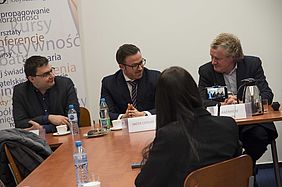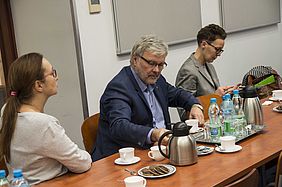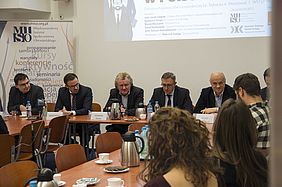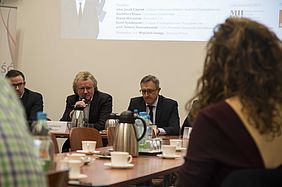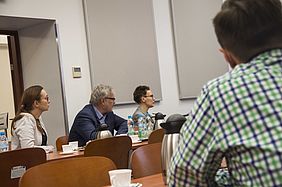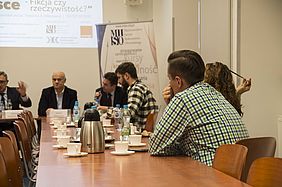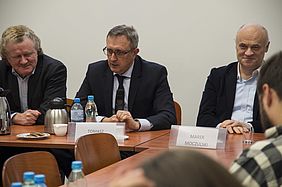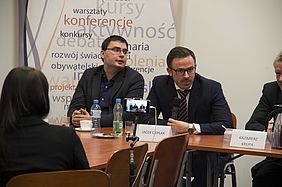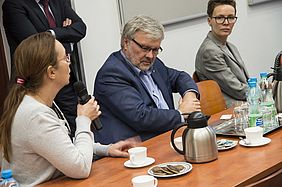Taking part — as presenters — in the meeting were: Jacek Cieplak (Deputy Spokesman for Small and Medium Sized Entrepreneurs), Kazimierz Krupa (Drawbridge Law Office), Marek Moczulski (President of Bakalland S.A.), Kamil Rybikowski (The Union of Entrepreneurs and Employers), Professor Tomasz Siemątkowski (Warsaw School of Economics, Głuchowski Siemątkowski Zwara Law Office), and the discussion’s moderator was Wojciech Szeląg (Polsat Television).
A starting point for the discussion was an October 2018 Union of Entrepreneurs and Employers report in which the state of entrepreneurs’ rights in Poland was rated at 28 on a 56 point scale (two points worse than 2017). This result categorizes us as a country in which entrepreneurs’ rights are moderately respected. The report was created under the auspices of the Spokesman for Small and Medium Sized Entrepreneurs.
Panelists agreed that a large problem for entrepreneurs is poor lawmaking quality. The law is imprecise, unclear and often conflicting, and the judicial system is unwieldy. In effect, we deal with a high amount of legal uncertainty. Another equally important problem is the mentality of government officials, on whose help one can rarely rely. According to the experts, we are also observing activities that have as their goal the creation and strengthening of a negative view of business.
Kazimierz Krupa of Drawbridge Law Office stated that the atmosphere in which a business operates is more important than the letter of the law, and at the moment this atmosphere is not the greatest. In his opinion, we are experiencing pronounced overregulation. Instead of removing inefficient regulations, we are creating new ones that are supposed to improve those that aren’t working correctly. At the same time, despite conditions that are not exactly favorable, Poland occupies the top spot in Europe amongst entrepreneurial rankings in terms of propensity to assume business risk. Taking into consideration the fact that entrepreneurship in Poland is only 30 years old (starting from the passing of Wilczek’s Law), the panelist stated that we are coping quite well.
According to Marek Moczulski of Bakalland S.A., we still encounter an incompetent approach of the state towards business. Mutual trust, which is currently lacking, is extremely important. At any moment, an honest entrepreneur can turn out to be a criminal due to a literal interpretation of the law. Bakalland’s President — who carries out business activities in a number of countries around the world — also drew attention to the difference in values systems, specifically in terms of keeping one’s word (among others). There are countries where a contractor cannot easily execute their jobs. It is significant that those places in which agreements are respected belong to the most developed countries in the world.
Kamil Rybowski from The Union of Entrepreneurs and Employers brought up the problem of unhonored payment deadlines for services rendered. Bottlenecks in public projects are usually to the advantage of large contractors, who are borrowers of smaller ones, and a contract’s fulfillment often relies on a given micro-enterprise’s liquidity. The government has noticed this weak point of the system, and it appears that a law on payment bottlenecks prepared by the Ministry of Enterprise and Technology will at least allow for a reduction in its scale — the panelist admitted.
Professor Tomasz Siemiątkowski of Głuchowski Siemątkowski Zwara Law Office noticed that, while private law in Poland is at a high level, the same cannot be said about public law. Within public law we have to deal with tax law, which is not transparent. Law is often formed in incompetent environments, and that is why its quality is poor. Furthermore, the legislative process isn’t coordinated. Conflicts, rather than cooperation, exist between ministries. According to the Professor, it is worth it to consider forming a ministry without a portfolio that would comprehensively take care of economic justice, within which lies the largest problem. He also drew attention to extended audits of businesses. In his opinion regulations that allow for business audits by a single government entity, as well as ones that limit their duration, should be introduced simultaneously
Jacek Cieplak agreed with the opinion of other panelists on the unwieldy judicial system, observing that ideas on the part of business representatives as to how to correct the situation are lacking. He noted that the Ministry of Enterprise and Technology is trying to work on corrections to the plight of entrepreneurs in Poland, but that it also must reckon with other ministries which — in realizing their own interests — usually don’t agree on a proposed solution. In his opinion, a large problem for entrepreneurs and workers is also high taxes on labor.
This debate was organized by the International Institute of Civil Society and the Committee for Social Dialogue of the National Economic Chamber (as organizers), as well as Orange Poland (as partner).



